- Home
- Brian Keene
The Library of the Dead Page 3
The Library of the Dead Read online
Page 3
You wouldn’t have recognized me. I was wearing an army-surplus jacket and had greased my hair so it looked a lot darker than it was. If you didn’t look twice—and why would you?—you’d take me for a grad student who’d just finished finals and was hitting the Pacific Northwest trail for a summer adventure. And that was the story (exactly) I would have told had I run into a park ranger.
But I didn’t run into a ranger. I didn’t encounter anyone at all, except the person I was looking for. The one who liked to go for a run every night after dinner, no matter where she happened to be.
“Hi Rebecca,” I said as I stepped out of the trees.
Rebecca’s Nikes were new and expensive—electric blue with coral stripes, probably fresh out of the box. Her back was to me, but her little stutter-step told me she recognized my voice. Just that fast her toes dug firmly into the sand, and she stopped cold.
“Don’t turn around,” I said. “It’ll be easier that way.”
Even as I spoke, I knew Rebecca wouldn’t heed my warning. Her sharp inhalation cut the silence, and then a big wave broke across the beach and slapped the sound away. The sea wind caught Rebecca’s blonde hair, masking her face as she turned. She just couldn’t help herself—I’m certain she already had a few persuasive paragraphs worked up to lob my way.
“I warned you,” I said, and I fired the Taser before she could say a single word.
That was that. Dr. Nakamura hit the sand face-first. I dragged her into the forest. An hour later I was back on the road. Several hours beyond that, I was home. Rebecca’s corpse was tucked away in one of my storage units, wrapped up nice and neat in a GE freezer. I’d finish with her later. After all, I had a date with Daphne the next day at noon, and it was already long past midnight.
I needed to get my rest.
If I shared it, you’d recognize the name of the cemetery where Daphne and I had our first date. It’s famous. But I think I’ll keep that information to myself. I suppose I’m a little sensitive about the place after the way things turned out. You’ll have a better understanding of why later.
Anyway, as prominent as the place was, I’ll bet no one had ever picnicked there. That’s exactly what Daphne and I did on an afternoon that was as still as it was sunny—May light filtering through the trees, chill patches of shadow not quite ready to warm despite the change of seasons, the scent of pine and cut grass, the cool appraisal in Daphne’s guarded glances.
Daphne (of course) had done her research. She said that cemeteries had been akin to city parks in Victorian times, when families would spread tablecloths on the grass and share memories of their dear departed along with roast squab and pickled eggs on sunny Sunday afternoons.
I can’t speak for Daphne, but I certainly had no one to mourn with that level of sincerity. What I did have was Daphne’s company and the picnic lunch she prepared. A pleasant Pinot gris, nicely chilled. Fried chicken, a loaf of sourdough with wedges of Irish butter, and an apple and grape salad with sour cream dressing. Cherries and chocolate cake.
Unfortunately, the conversation didn’t match the food. The words that passed between us were simple chit-chat, with none of the electricity of our phone call. Just some mundane gossip about classmates and instructors, with a few conversational detours concerning the cemetery’s more infamous residents. All that was entertaining enough as far as it went, but it wasn’t the kind of conversation I’d hoped for … and I’m sure Daphne felt the same way.
All that changed as soon as we emptied the bottle of wine and packed the picnic basket.
“Ready to check out the library, Mr. Burke?”
“Definitely, Ms. Hare.”
“I should warn you—it’s a library with spirits.”
“As in: distilled?”
The exchange passed so quickly it seemed we had rehearsed it, as chipper and quippy as dialogue in an old William Powell/Myrna Loy movie that was about to get much more twisted than Warner Brothers would have ever allowed. But neither of us laughed when it was over. For the truth was that we had simply progressed to the next point on the agenda, as in: I followed Daphne down a path that led to the edge of the cemetery grounds.
A cathedral stood at the end of the path … or at least a building I took for a cathedral. Inside was something else entirely. Instead of a large room with a vaulted ceiling, the building was a tangle of twisting corridors and oddly shaped rooms. The walls of each were lined with golden books that weren’t books at all, but instead boxes bearing the cremains of the deceased with their names etched on the spines. The correct term for the place (I knew) was columbarium, but indeed it was a library, and it felt like one. For just as books do, each of these boxes held a particular story.
Of course, I never would have believed those stories could be shared. Daphne, I soon discovered, thought otherwise. Even her walk through the place was a lesson in that, for she brought with her the percussion of coffin nails. Her heels clicked along the empty corridor, each step a seeming precursor for a small ending, and as she walked she ran one black-nailed finger along those golden spines, as if searching for the beginning of a tale that struck her particular fancy.
I followed her down the corridor, listening to the scrape of that nail. Without turning to face me, Daphne asked: “So … do you believe in spooky stuff?”
“What do you mean?”
“You know—001.64.”
“We’re talking paranormal phenomenon?”
“You can close down the parameters a little: spectral manifestations … shades and revenants … your basic things that go bump in the night.”
“Well, I suppose I’m the kind of person who believes what he can see.”
“You mean, you’re a proof is in the pudding kind of guy?”
“I suppose so.”
“Then let’s see what we can see, Stagger Lee … or maybe what we can feel.”
Daphne turned and smiled at me, and that same finger she’d run across a hundred etched spines brushed my lips and crossed my chin. Only for a moment. Then she turned away, advancing down a narrow hallway. Her hips swayed beneath her skirt, and her fingers arched into claws, a fistful of nails scratching over spines.
The briefest moment later her fingers stopped, very quickly, index finger poised on one particular spine. “Ohhhh,” she said, and it was the kind of sound I’d never heard from Daphne before. It echoed through the columbarium hallway like a sound from a cave.
“They say some people are mediums,” Daphne said. “They stir shadows, raise the past and the dead, hold them in their grasp. For a while, for a time … and then that time is gone. In that regard they’re like imperfect vessels, I suppose. But they’re something more, too.”
“People say all kinds of things.”
“So—no verdict on that particular form of perception?”
“Uh-uh.”
“Let’s conduct a little experiment then. For example, it’s my perception that this particular box is filled with firecrackers, psychically speaking. I’d like you to touch it and see what happens.”
“I don’t know.”
“C’mon. Take a chance.” Daphne smiled. “Do it and I’ll guarantee a reward … later.”
“Not my thing, really.”
“Well there’s a surprise.”
“Uh.” I stammered. “Well … maybe it is. Sometimes.”
“Okay. You’re the boss, applesauce … but just one other thing —our date’s over.”
Daphne turned away. From me. From the columbarium book. She started walking and didn’t look back, heels clicking down the hallway, those little nail-driving steps marking percussion to my thoughts. Quite literally, she was disappearing into the shadows, and before my very eyes.
My hand reached out before I even knew it, fingers touching that yellow spine. But it wasn’t a spine at all … at least not one you’d find on a book, or a box. No, it was too cold and slick, its ridges mimicking movement like those grave-worms knotted across that horrible face in my dreams. And then th
ere were words, and they weren’t Daphne’s. “You see, my friend. We meet again.”
And now that face hung before me, above a buckled collar cinched from dead whore’s nightmares. The thing wore a top hat, and it leered with that knotted-worm smile. One whiff of its breath and a wave of dizziness hit me so hard that for a moment I imagined I was back on that beach with Rebecca, cold Pacific tides pounding me to the ground as she escaped down the beach in her blue-and-coral Nikes. And even in the moment I realized that was only a fantasy, one shorn of every notion of personal power possible. I tried to focus, managed just for a moment to read the name on the spine of the book, and then the letters were lost in a wet, smeared sheen.
So was everything else.
My knees buckled. I was about to pass out.
I started to fall. Daphne didn’t allow that. Suddenly she was very close, holding me up. “I’ve been coming here for a few years,” she said. “Touching a spine here, a spine there—collecting impressions. I remember the first time I touched that book, and he told me who he was. I couldn’t believe it, not at first. Later, I couldn’t deny it. And now he’s my special friend, one of a kind, no one like him anywhere. At least, I always thought so … until I met you.”
Daphne’s wine-dark lips drew closer, close to my ear. But her voice was far away, as if deep inside a seashell … or a memory boxed away. “Remember that day in class? When you loaned me a pencil? It started then. I got my first little tingle of you. And now there’s nothing I don’t know about you. I’ve been inside your storage units. Those are nice boxes you built for Dr. Nakamura … they should be a good fit. I’ve even held your knives. In fact, I borrowed one a few weeks ago, the night we took our final for AARC2. Remember that little dweeb who always sat in the front row? The one who asked the same question three different ways in every class? Well, his questioning days are over.”
“I need to sit down,” I said. “I think I’m going to pass out.”
“Don’t get fried, Mr. Hyde,” Daphne said. “Not during our very first dance. He wouldn’t like that.”
I said something, but I can’t imagine what it was. Moments had passed … perhaps minutes. The next thing I knew, Daphne was already moving away. I toppled sideways, leaning against the wall, trying to steady myself. Daphne’s heels clicked over the tile floor. I tried to measure time by her footfalls. I still couldn’t move. I was buried in a dream—her dream or mine, I couldn’t be sure—and those coffin-nail footfalls were driving deeply … over and over and over again.
Daphne was further away now … very far.
And then she was gone.
A door swung open, and a breath of wind washed over my back.
Outside the door Daphne voice rose over the marble forest ahead, and lingered behind.
“Come along now,” she said. “After all, I keep my promises.”
I don’t know how I managed it, but I began to follow.
The darkness followed behind me.
No doubt Daphne had made promises to it, as well.
No one had ever been in my apartment before. Except the landlord, and a plumber when I had to have the toilet replaced. But now that we were there the rooms seemed too small and the things they contained even smaller. And the bed, well … it was only a single bed, but Daphne said it wouldn’t matter because our real bed was darkness itself, and without borders. That was fine with me. I welcomed darkness wherever I found it.
That night, I hoped the shadows would deliver my mind to other places … alone. But you can’t be alone with lovers, even in the dark. And so it was with us and the thing from the columbarium. Daphne and I, alive on a hideous canvas, our hearts pounding, the two of us writhing in the night as worms that twist and couple in a ripe grave. That thing an oozing mess around and under and over and in, free of its buckles and clothes, ripe and corrupt.
Whether it was climax or prelude was a matter of perspective. As act or ceremony, the grave was the grit of it, and blood was its heart. Still Daphne burrowed in and so did I, like hungry little grave worms seeking the choicest morsel. There was no other choice, but any pleasure found was quickly lost between lips and belly in the manner of a ghoul’s meal.
Or, to put it more succinctly:
“A nightmare?” you ask.
“Of course,” I reply.
What else could I call it? For in truth or imaginings, nightmares must be endured. And as I drifted off to sleep, I thought it would have been better if we were all past enduring. If (on this night) we’d all worn knives for fingers instead of flesh and shadow. Make that simple adjustment, and the three of us would have slashed the darkness to ribbons and left nothing for the coming dawn but a puddle of gore fit only for the coroner’s pail.
It would have been better that way, I think.
For in the end, the worms indeed had their way.
When I awoke in the morning, Daphne was already gone. She had a waitress job not far from the college where we attended library school, so she’d probably put my apartment in her rearview mirror long before the sun came up. The only thing she left behind was a lipstick message on the bathroom mirror:
Stay loose, Dr. Mabuse.
We’ll see you soon.
Xoxoxo,
364.1523³
Of course, I knew that Dewey Decimal number by heart long before I ever picked up a knife.
Amping it up to the third power was a nice touch, though.
Then again, I’ve never been much of a joiner.
I left my apartment not long after that, grabbing coffee, then waiting for the cemetery gates to open. Once inside, I made my way to the library … or the building that passed for one.
No one was there, of course. At least, no one living … not at this early hour. That was fine with me. There was only one thing I was after—I wanted another look at the name on the columbarium box I’d touched the day before, and I wanted to write down the dates of birth and death. That seemed as good a place as any to begin my research.
I hurried down the hallway, retracing my steps. Of course, I remembered the spot, and for a moment it was as if I walked in my own shadow, and the echo of my footsteps was an echo of Daphne’s from the day before.
I shook those impressions away. All I wanted was that book, and the information on the spine.
My hand traveled upward, fingers spreading.
The nail of my index finger traveled spines, as Daphne’s had the day before. And then it came to a gap.
To the place a book had been.
In its place was another box—the Japanese puzzle box I’d built for Rebecca. It sat on the shelf, as open as open could be and just as empty. There was no storage-unit key inside.
I grabbed the box and hurried away from the chapel and the cemetery. Feeling, with good reason, like an exorcised spirit.
It would have been a relief to go to work the next day, except for the eight a.m. phone call from the library director requesting that I come in early for a meeting. A few hours of uncomfortable tension passed before the appointed time arrived and I dropped my backpack on a chair in his outer office. His administrative assistant led me inside.
“I know you’re a creature of the night, working the shift you do,” the director said. “Thanks for coming out in the light of day.”
“I wore my 666 sunblock,” I said, “just to be safe.”
“Good one.” He laughed. “Now let’s get to it. Looks like you really knocked out all the repair work we’ve been throwing at you. I think it’s time you put the scrapper and glue away for a while. Now that you’re getting your Masters, we’ll give you something really interesting to work on.”
“Such as?”
“Let’s take a walk, and I’ll show you.”
I followed the director, waiting for the other shoe to drop. We took the three flights to the Archives office, my suspicions mounting with every step, just waiting for him to say something about my hidden toolbox or some other troubling evidence. But the only things the director talked about wer
e his doctor and his cholesterol numbers. Needless to say, he wasn’t happy with either.
By the time we reached the third floor, I’d begun to relax. Obviously, this wasn’t about me. The Archives itself was empty at this time of day. The main office adjoined several workrooms, and the director used his master key to make the trip down a narrow hallway leading to the very last one.
“You really won’t believe this stuff,” he said. “It’s been in a warehouse over in Oakland for close to a hundred years. The place is changing hands, so the college had to relocate a ton of material that’s been stored there since Moses was a baby. Mostly papers that belonged to a doctor who left his entire estate to the college years ago. He was a Brit expat who did pretty well for himself after immigrating in the 1890s, and he didn’t have any relations … at least on this side of the pond. After his death, the college got his money and the library was stuck with rest of it—you know, the usual story. Who knows what the collection amounts to, but I think you’re the man to give it a look and decide what’s what. There’s a ton of books on esoteric religions and cults—but I have a feeling a lot of that’s just landfill waiting to happen. Seems the silverfish got to it long ago… or something that was hungry, anyway.”
“And the rest of the collection?” I asked.
“Well, who knows? Turn-of-the-century scuttlebutt was that our doctor friend might have been the abortionist of choice for the privileged class of his day, so there might be something interesting. Buddy up with someone in the Women’s Studies department, you might even get a juicy paper out of it.”
The director unlocked the door. Even before it swung open, I had an idea what I’d see … and my gut told me it was something I knew I’d recognize.
“First off, here’s your full box of morbid,” the director said, pointing at an object on a table in the center of the room. “That’s a Victorian autopsy kit. Saws and knives and the whole nine yards. Can you believe it?”

 The Rising
The Rising Entombed
Entombed Take the Long Way Home
Take the Long Way Home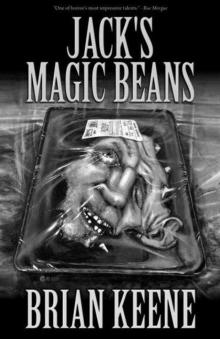 Jacks Magic Beans
Jacks Magic Beans Ghost Walk
Ghost Walk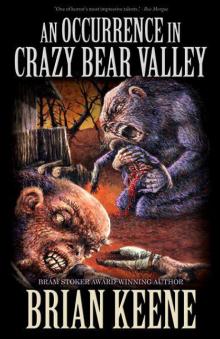 An Occurrence in Crazy Bear Valley
An Occurrence in Crazy Bear Valley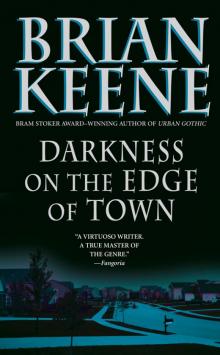 Darkness on the Edge of Town
Darkness on the Edge of Town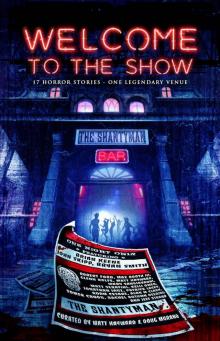 Welcome to the Show: 17 Horror Stories – One Legendary Venue
Welcome to the Show: 17 Horror Stories – One Legendary Venue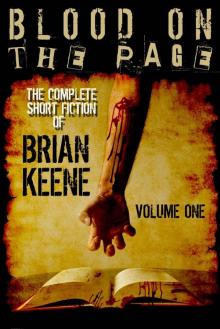 Blood on the Page: The Complete Short Fiction of Brian Keene, Volume 1
Blood on the Page: The Complete Short Fiction of Brian Keene, Volume 1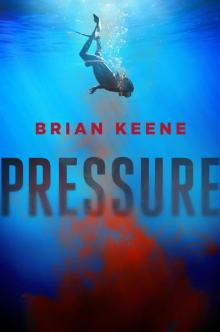 Pressure
Pressure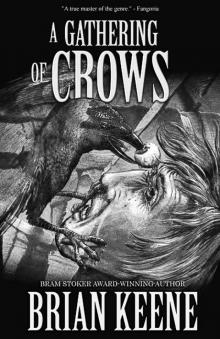 A Gathering of Crows
A Gathering of Crows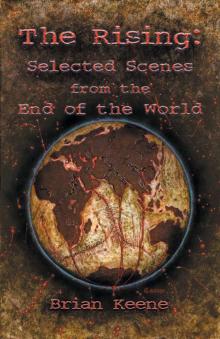 The Rising: Selected Scenes From the End of the World
The Rising: Selected Scenes From the End of the World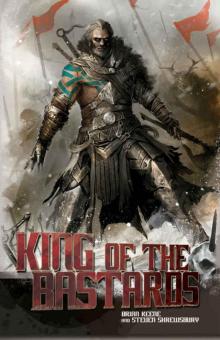 King of the Bastards
King of the Bastards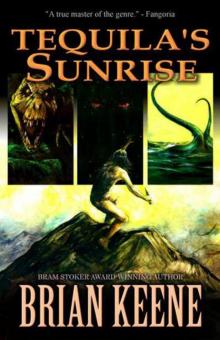 Tequila's Sunrise
Tequila's Sunrise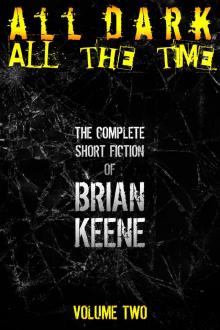 All Dark, All the Time
All Dark, All the Time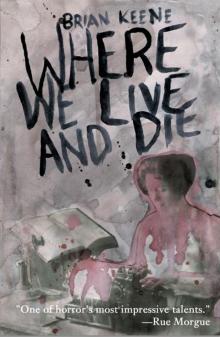 Where We Live and Die
Where We Live and Die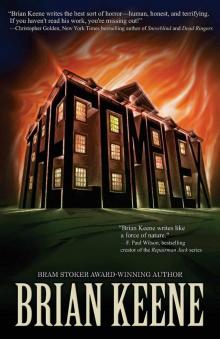 The Complex
The Complex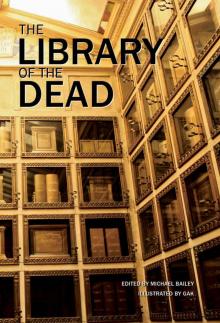 The Library of the Dead
The Library of the Dead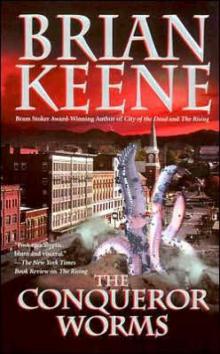 The Conqueror Worms
The Conqueror Worms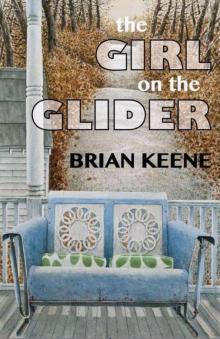 The Girl on the Glider
The Girl on the Glider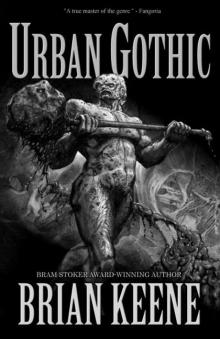 Urban Gothic
Urban Gothic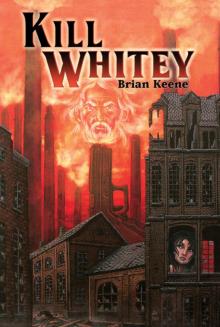 Kill Whitey
Kill Whitey Terminal
Terminal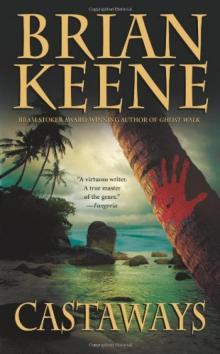 Castaways
Castaways